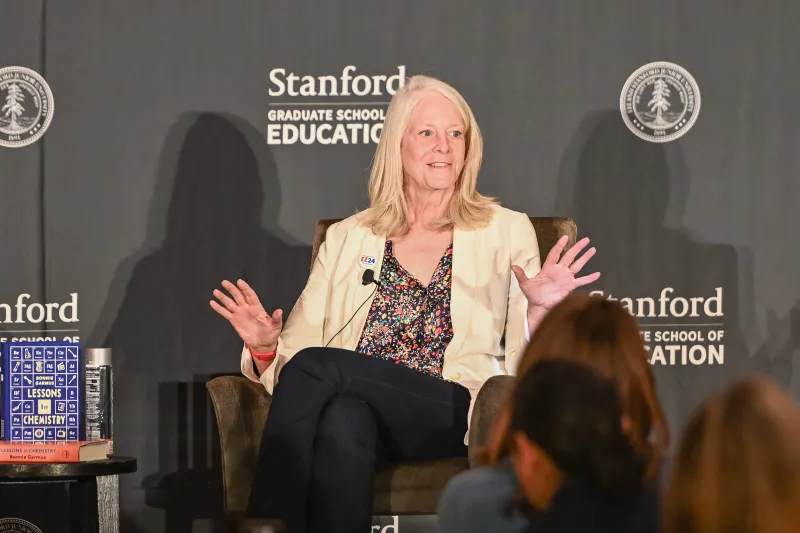When Bonnie Garmus wrote Lessons in Chemistry, her novel that spent 58 weeks on the New York Times bestseller list, she was “writing [her] own role model.” At Thursday’s Cubberley Lecture, moderated by Christine Min Wotipka A.M. ‘99, Ph.D. ‘01, an associate professor of education and, by courtesy, sociology. Garmus spoke on writing, STEM, academia and her personal life.
Graduate School of Education professor Jo Boaler, who introduced Garmus, became friends with the author when they discussed the book online and soon found themselves living parallel lines. “She lived in Palo Alto and now lives in London. And I lived in London and now live here,” Boaler said.
“Lessons in Chemistry” takes place in 1960s Southern California and follows Elizabeth Zott, a chemist who later becomes a television cooking show host after finding failure in an academic career. Garmus was originally motivated to write the book based on her own personal experience in the workplace, one that many women in the audience found relatable.
Garmus recounted a meeting she’d had while working in tech where she was being “the only woman in the room again for the 9 billionth time.” She was serving as creative director and presenting an idea for a campaign, only for a man in the room to present the same idea and have his be agreed with immediately. “And that day I was, well, we’ll just say I was pretty mad. And I stomped back to the desk and instead of working, I wrote the first chapter of lessons in Chemistry.”
Garmus would continue to write “Lessons in Chemistry” in “the cracks of the day,” when she wasn’t working at her job.
“I don’t really know novelists who only write novels, to be honest. Most novelists need another job. You definitely need another job,” Garmus said. Like her protagonist, Elizabeth Zott, Garmus is also a rower and would get up early to row, and on the days she didn’t row, she would wake up early in the day and write.
“My process is really just that I am what my husband calls an exploratory writer. That’s nicer than saying that I’m a chaotic writer. I do a lot of exploration as I write,” Garmus said. She doesn’t plot or plan before she writes.
Elizabeth Zott was written as a chemist because cooking is chemistry, said Garmus. She knew she wanted Zott’s character to go on television to share her message, and women at the time were usually on television to teach something relating to the home. Garmus wanted Zott to subvert expectations and host a television cooking show where she taught her mostly female audience things beyond just the recipe.
This also meant Garmus had to do some of her own chemistry research, as well as asking experts to help with fact-checking.
Wotipka also asked Garmus to address gender issues in science and education and parenting, two major themes of her book and her own life.
“We need humanists. We need people from the arts; we need all the voices. When I wrote this book, I was really concentrating on STEM; the truth is this book applies to women in the arts,” Garmus said.
The first Cubberley Lecture, named after the first dean of the Graduate School of Education (GSE), Ellwood Cubberley, took place in 1938. It became a lecture series “after an endowment was formed from gifts given to the school, on the retirement of the school’s first dean, Elwood Cubberley, by Stanford colleagues and others,” GSE spokesperson Brooke Donald wrote in an email to The Daily.
Sydney Kaminski ‘25 appreciated Gramus’ vulnerability when talking about her writing process and experiences. Kaminski was in a private discussion with Garmus before the event and said she was the most “personable speaker” she had ever interacted with.
For Rebecca Smith ‘25, the book meant a lot to her and her family, so hearing her speak about her experience writing it was very special.
“And it was just really impactful to see the generations of women that were here. And so powerful to know that this book has resonated with people across a range of ages,” Smith said.
